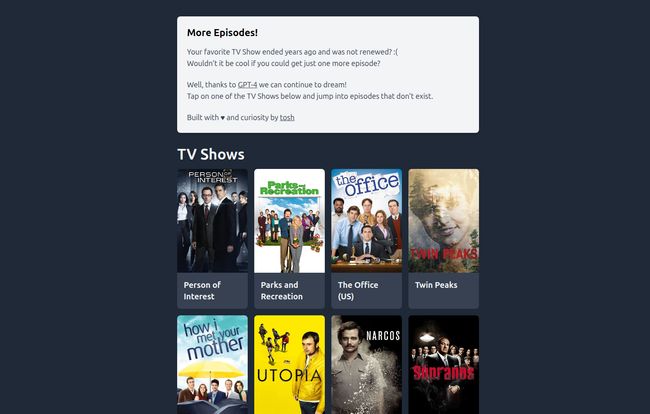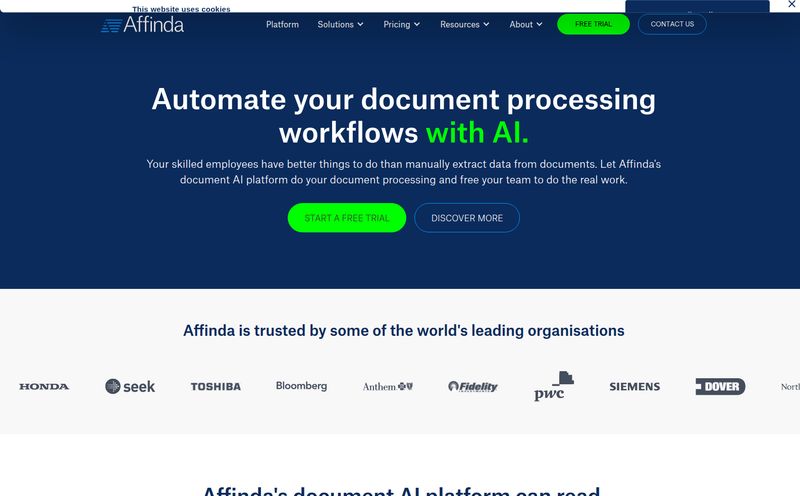We’ve all been there. You find a show. You fall in love with its characters, get tangled up in its world, and obsess over its cliffhangers. And then… poof. The network pulls the plug. It’s a special kind of grief, isn't it? For me, it was Firefly. I'm still not over it. That cancellation left a gorram hole in my heart that's never quite healed. I’ve spent years imagining what Season 2 would have looked like. What other misadventures would the Serenity crew get into?
It’s the ultimate fan question: “what if?”
Well, someone finally built a playground for that question. It’s a simple website called More Episodes, and it does exactly what the name implies. It uses the magic (and frankly, slightly scary power) of AI to generate brand new, hypothetical episodes for shows that have long since faded to black. And I have to say, I'm intrigued.
So, What Exactly is This 'More Episodes' Gizmo?
At its core, More Episodes is a brilliantly simple idea executed with some seriously complex tech. The homepage is just a wall of familiar show posters, a visual graveyard of television's greatest hits and tragic misses. From The Office and Friends to cult classics like Pushing Daisies and Utopia. You pick a show, click on it, and the platform, powered by OpenAI's GPT-4, dreams up a new episode for you.
It's not bringing these shows back from the dead, not really. Think of it more like a digital seance. It’s a way to commune with the ghosts of characters we miss, to see them in one more story, even if that story is just a beautiful, well-written fabrication. It’s fan fiction on steroids, written by a machine that has consumed more television than any human possibly could.

Visit tosh TV Shows
A Test Drive with an Old, Departed Friend
Of course, I had to take it for a spin. My cursor hovered over a few options—Breaking Bad? Nah, that ending was perfect. Game of Thrones? I'm not sure I'm ready to open that wound again. My eyes landed on Freaks and Geeks. The ultimate “gone too soon” tragedy. One perfect season. That's all we got.
I clicked. And waited with that little flutter of anticipation you get before a season premiere. What would the AI cook up for Lindsay, Sam, and the rest of the William McKinley High crew? Would it capture the awkward, hilarious, and deeply human tone that made the show a masterpiece? The result was... interesting. It wasn't perfect, but it wasn't a soulless machine-written script either. It felt like a plausible B-side, a deleted scene with a bit of extra polish. The dialogue wasn't quite Paul Feig or Judd Apatow, but the AI understood the characters' voices. It got the vibe right, and for a free tool on the internet, that’s honestly pretty remarkable.
The Good, The Weird, and The AI-Generated
Look, let's be real. A tool like this is going to have its highs and lows. It's not a miracle worker, but it is a fascinating new toy for TV lovers.
What I Absolutely Love
The sheer creative potential here is off the charts. It's a fantastic cure for creative block and a fun way to revisit worlds you thought were closed forever. The user interface couldn't be simpler – you just point and click. There's no learning curve, no complex prompts to write. The platform's use of GPT-4 is a huge plus. We've all seen clunky AI text, but GPT-4 is a different beast. It has a much better grasp of nuance, tone, and maintaining character consistency, which is absolutely critical for this kind of thing.
The... Quirks You Should Know About
First and foremost, you have to go in with the right expectations. This is not canon. Nothing generated here is official. It's a hypothetical exploration, a what-if machine. If you're a purist, this might make you break out in hives. Secondly, the quality can be a bit of a mixed bag. One generated episode might feel shockingly insightful, while the next might misunderstand a key character motivation or create a plotline that feels a bit... off. It's like listening to a really, really good cover band. They hit all the right notes, but you can still tell it's not the original artist. Sometimes the guitar solo is just a little bit wrong.
Is This Thing Even Free?
As of right now, yes. It seems to be completely free to use. There’s no pricing page, no subscription pop-ups, no “buy credits to generate” nonsense. It feels like a passion project, something made by a fan, for the fans. How long will that last? Who knows. In the current AI landscape, projects like this often start free to build a user base before exploring monetization. Maybe they’ll introduce a premium tier for longer episodes or a small fee to keep the GPT-4 API costs covered. For now, though, it’s a free-for-all, and you should definitely check it out while it is.
So Who Is This Really For?
I’ve been thinking about this. It’s obviously for the die-hard fan, the person who spends hours on Reddit debating finale theories. But I think it’s also for aspiring writers, people who want to see different story structures and character arcs play out. It's a prompt generator on a massive scale. It’s for anyone who ever watched a series finale and thought, “I could have written a better ending than that.”
This isn't about replacing human writers—a topic that, believe me, is a huge and important conversation in the industry right now, especially after the recent WGA discussions. Instead, I see this particular tool as a supplement to our fandom. It's a new way to interact with stories. A tribute, not a replacement. It’s a way to keep the campfire stories going, long after the original storytellers have gone home.
Final Thoughts on My New Favorite Time-Waster
More Episodes is a fascinating, fun, and slightly flawed glimpse into the future of fandom. It won't bring your favorite show back, but it offers something almost as good: a sense of continuation. It’s a testament to how much these stories mean to us, that we're now building advanced artificial intelligence to imagine just one more adventure. It's a beautiful, nerdy, and deeply human thing to do. Now if you'll excuse me, I have a hypothetical second season of a certain scifi western to go binge-read.
Frequently Asked Questions
- How does More Episodes AI actually work?
- It uses OpenAI's GPT-4, a powerful language model, as its engine. The AI has been trained on a massive amount of text from the internet, including scripts, summaries, and fan discussions. When you select a show, it uses that knowledge to generate a new, hypothetical episode script or summary that tries to match the original's tone, style, and character voices.
- Is the content from More Episodes official or canon?
- No, not at all. The content is purely hypothetical and generated by an AI. It is not affiliated with the official creators or networks of the shows. Think of it as high-tech fan fiction.
- What TV shows can I find on the platform?
- There's a huge and growing list! It includes major hits like The Sopranos, Breaking Bad, The Office, and Game of Thrones, as well as beloved cancelled shows like Firefly, Freaks and Geeks, Pushing Daisies, and many, many more. The library is quite extensive.
- Is More Episodes free to use?
- Currently, yes. The website appears to be completely free to use. There is no information available about any future plans for subscriptions or paid features, but that could change over time.
- How good is the quality of the generated episodes?
- It varies. Because it's an AI, the quality can be inconsistent. Some generated episodes can be surprisingly clever and true to the source material, while others might feel a little generic or miss the mark on character nuances. It's best to go in with an open mind and a sense of fun.
- Can I request a show that isn't on the list?
- There isn't an official feature for this right now, but many projects like this are responsive to user feedback. It's possible the creators might add shows based on popular demand in the future, but there's no guarantee.
Reference and Sources
- More Episodes - The AI tool for generating new TV show episodes.
- Writers Guild of America (WGA) - For information on the role of writers and AI in the entertainment industry.



